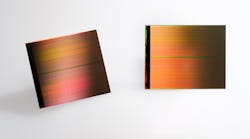Micron Moves Ahead With Plans to Take Over IM Flash Technologies
Micron Technology is moving ahead with plans to take over the IM Flash Technologies business it founded with Intel in 2006. In October, the company said that it planned to spend $1.5 billion to buy Intel's 49 percent stake in the joint venture, which is responsible for the development and manufacturing of 3D XPoint memory chips.
On Monday, Micron announced that it had exercised its right to take over Intel's share in IM Flash Technologies, which currently employs around 1,700 people. IM Flash will continue supplying Intel with XPoint memory wafers for a year after the deal closes. The terms of the agreement mean that Intel can close the deal at any point before January 14, 2020.
"The IM Flash acquisition will enable Micron to accelerate our R&D and optimize our manufacturing plan for 3D XPoint," said Micron chief executive officer Sanjay Mehrotra, adding that it will "provide us with the manufacturing flexibility and highly skilled talent to drive 3D XPoint development and innovation, and to deliver on our emerging technology roadmap."
After building the second generation of the XPoint technology together in the first half of 2019, Intel and Micron plan to stop collaborating on future developments. That also means independently funding future XPoint memory nodes. (Last year, the companies also announced that they would discontinue their joint development of NAND flash memory.
XPoint is designed with thin columns of memory cells stacked tightly in a crosshatch pattern, allowing the cells to be accessed independently, resulting in lower latency and higher endurance versus NAND flash. The memory is also nonvolatile, meaning that it can save information even after power is cut. That contrasts with chips based on DRAM, which is erased without constant power but can be altered and accessed faster than XPoint.
Micron plans to release chips based on 3D XPoint technology in 2019, while Intel introduced its Optane persistent memory product line last year. Intel is building memory controllers into its latest Cascade Lake and Cooper Lake server chips to support Optane, which could challenge DRAM as main memory in data centers. The Santa Clara, California-based company has some high-profile customers, including Google.
"This was expected and has been part of Intel’s planning for some time," Intel said in a Monday statement. "Intel has manufacturing options available and has been shipping a broad portfolio of Intel Optane technology products for more than a year. Intel will continue to expand its product line and lead the industry with this exciting new technology."

